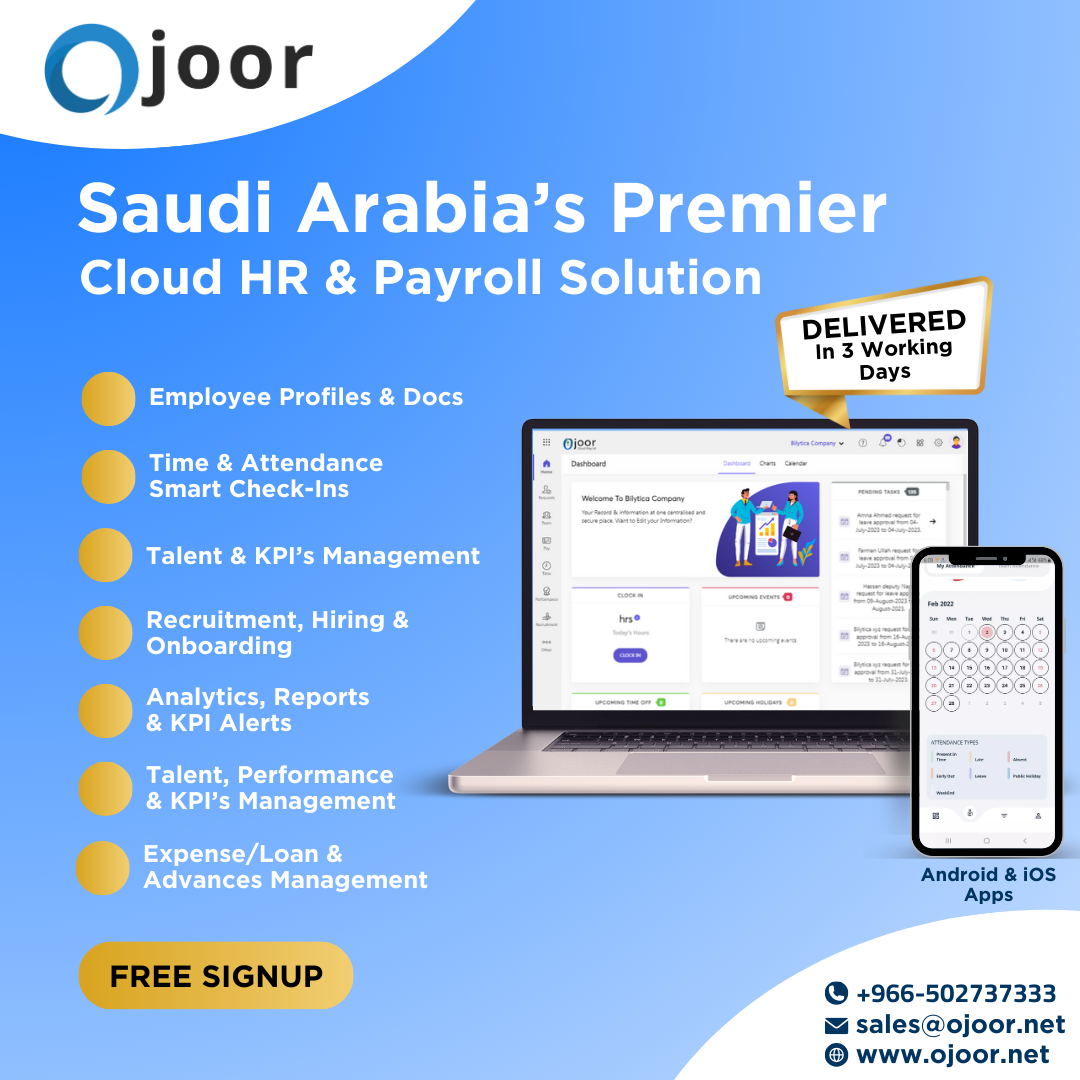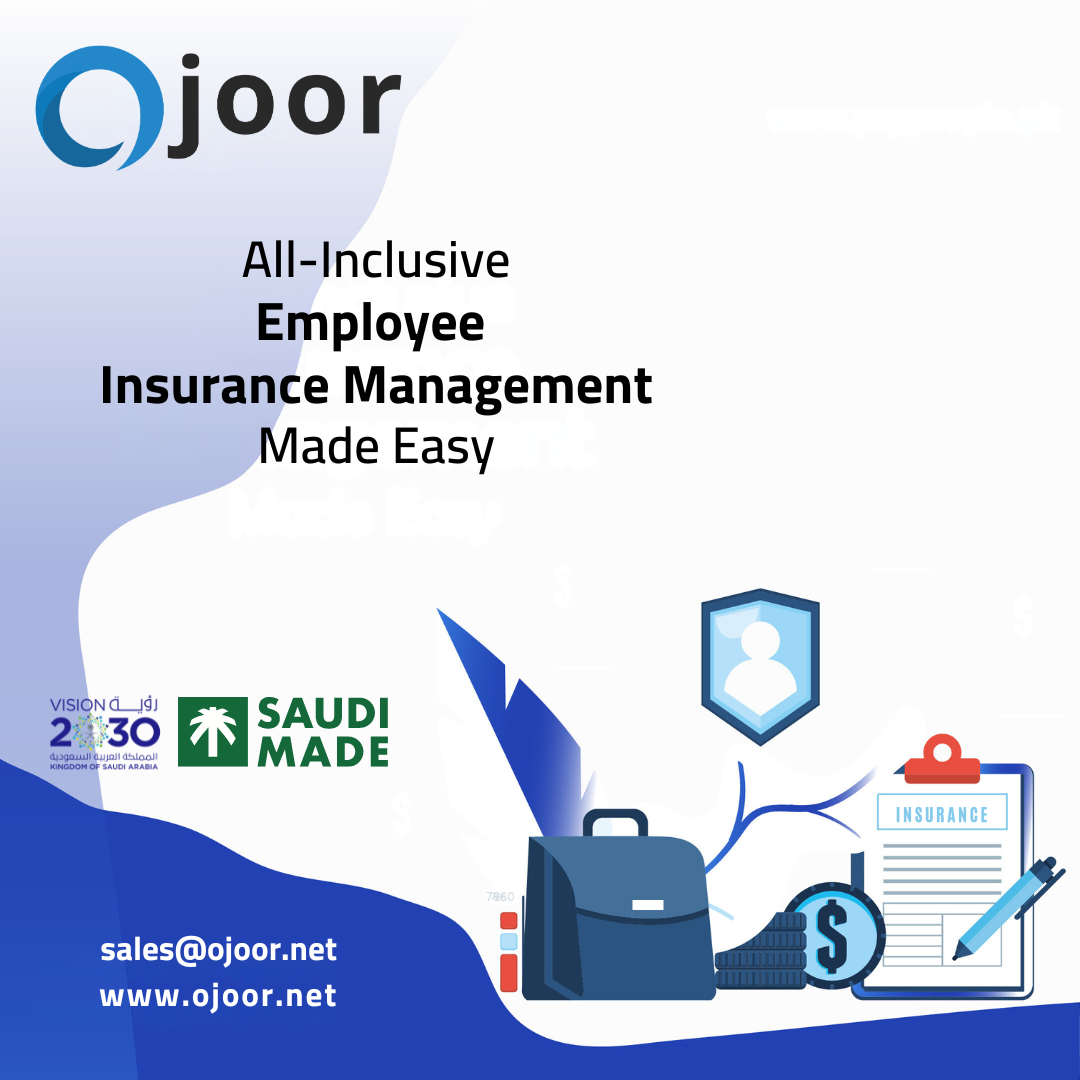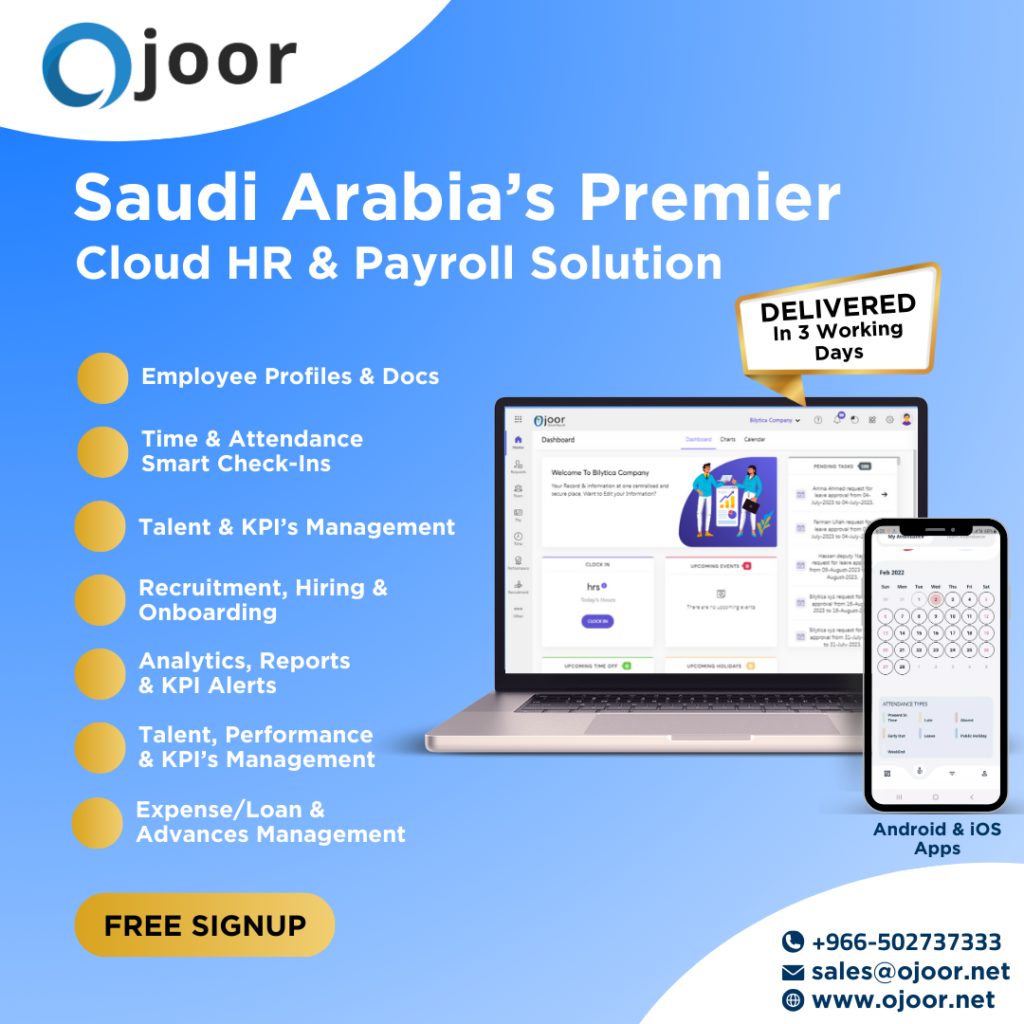Ojoor # 1 is one of the top HR System in Saudi Arabia and is critical for managing various HR functions in organizations. For Saudi Arabian companies, an effective HR system must cater to the specific regulatory, cultural, and operational needs of the region. This essay explores the essential features that an HR system should possess to meet the requirements of Saudi Arabian companies, ensuring compliance, efficiency, and improved employee management.
Click to Start Whatsapp Chatbot with Sales
Mobile: +966547315697
Email: sales@Ojoor.net
Ojoor #1 HR System in Saudi Arabia

Compliance with Saudi Labor Laws and Regulations
Labor Law Adherence
HR System in Saudi Arabia must is designed to comply with Saudi Arabia’s labor laws, including those governing employment contracts, working hours, overtime, leave entitlements, and termination procedures.
- Employment Contracts: The system should manage employment contracts, ensuring they comply with legal requirements and can be easily accessed and updated.
- Working Hours and Overtime: It should accurately track working hours and calculate overtime pay according to labor laws.
Wage Protection System (WPS)
Compliance with the Wage Protection System is crucial. HR systems should ensure that salary payments are made through approved banks and reported to the Ministry of Human Resources and Social Development (MHRSD).
- Payroll Reporting: The system must generate and submit payroll reports to the WPS, demonstrating compliance with wage payment regulations.
- Salary Disbursement: Integration with banking systems to facilitate timely and accurate salary transfers is essential.
General Organization for Social Insurance (GOSI)
HR systems should automate the calculation and deduction of contributions for GOSI, which provides social insurance for employees.
- Contribution Calculation: Automatic calculation of GOSI contributions based on employee salaries is crucial.
- Reporting: The system should generate necessary reports for GOSI to ensure compliance.
Employee Management and Development
Employee Information Management
An HR system must efficiently manage comprehensive employee information, including personal details, employment history, performance records, and more.
- Centralized Database: A centralized database for storing and managing employee information is essential for easy access and updates.
- Document Management: The system should support the storage and retrieval of important documents such as contracts, certifications, and identification documents.
Performance Management
Effective performance management features are crucial for evaluating and improving employee performance.
- Performance Appraisals: The system should facilitate regular performance appraisals, goal setting, and feedback.
- Competency Management: Tracking and managing employee competencies, skills, and development plans helps align workforce capabilities with organizational goals.
Learning and Development
Supporting continuous learning and development is important for employee growth and organizational success.
- Training Management: The HR System in Saudi Arabia should manage training programs, track participation, and measure effectiveness.
- E-Learning Integration: Integration with e-learning platforms allows employees to access training materials and courses online.

Payroll and Benefits Administration
Payroll Processing
Efficient payroll processing is a core feature of any Employee Management Software in Saudi Arabia, ensuring timely and accurate salary payments.
- Automated Calculations: The system should automate salary calculations, including basic pay, overtime, bonuses, and deductions.
- Tax Compliance: While personal income tax is not applicable in Saudi Arabia, the system should manage other statutory deductions and ensure compliance.
Benefits Management
Managing employee benefits effectively is crucial for employee satisfaction and retention.
- Health Insurance: The system should manage health insurance plans, including enrollment, claims processing, and renewals.
- Leave Management: Accurate tracking of leave balances, approvals, and accruals is essential.
Employee Self-Service Portals
Access to Personal Information
Employee self-service portals empower employees by providing access to their personal and employment information.
- Payslip Access: Employees should be able to view and download their payslips.
- Leave Requests: The portal should allow employees to apply for leave and track leave balances.
Communication Tools
Effective communication between employees and HR is facilitated through self-service portals.
- Feedback and Queries: Employees should be able to submit feedback and queries to HR and receive timely responses.
- Announcements: The portal should be used to share important announcements and updates with employees.
Recruitment and Onboarding
Recruitment Management
An efficient recruitment management system is essential for attracting and hiring the right talent.
- Job Posting and Applications: The system should facilitate job postings, application tracking, and candidate evaluations.
- Interview Scheduling: Automating the scheduling of interviews and assessments improves the recruitment process.
Onboarding
Streamlined onboarding processes ensure that new hires are integrated smoothly into the organization.
- Document Collection: The system should manage the collection and verification of onboarding documents.
- Orientation Programs: Scheduling and tracking orientation programs for new employees is important for their smooth transition.
Attendance and Time Management
Attendance Tracking
Accurate tracking of employee attendance is crucial for payroll processing and compliance with labor laws.
- Biometric Integration: Integration with biometric systems for accurate attendance recording.
- Remote Attendance: Support for remote attendance tracking, especially for employees working from home or in remote locations.
Shift Management
Managing shifts efficiently is essential for organizations operating in multiple shifts.
- Shift Scheduling: The system should facilitate the creation and management of shift schedules.
- Shift Swapping: Allowing employees to request and manage shift swaps.
Analytics and Reporting
Data Analytics
HR systems should offer robust data analytics capabilities to support strategic decision-making.
- Workforce Analytics: Analyzing workforce data to identify trends, such as turnover rates, employee performance, and training needs.
- Predictive Analytics: Using predictive analytics to forecast future HR needs and trends.
Reporting Tools
Comprehensive reporting tools are essential for compliance and performance monitoring.
- Regulatory Reports: Generating reports required for compliance with labor laws and other regulations.
- Custom Reports: Creating custom reports to meet specific organizational needs.
Security and Data Privacy
Data Security
Ensuring the security of sensitive employee data is paramount.
- Encryption: Using advanced encryption methods to protect data during storage and transmission.
- Access Controls: Implementing strict access controls to ensure that only authorized personnel can access sensitive information.
Data Privacy
Payroll Software must comply with data privacy regulations and ensure the confidentiality of employee information.
- Privacy Policies: Implementing and enforcing data privacy policies to protect employee information.
- Audit Trails: Maintaining audit trails to track access and changes to sensitive data.
Scalability and Customization
Scalability
HR systems should be scalable to accommodate organizational growth and changing needs.
- Modular Architecture: A modular architecture allows organizations to add new features and functionalities as needed.
- Cloud-Based Solutions: Cloud-based HR systems offer scalability and flexibility, making them suitable for growing organizations.
Customization
Customizable HR systems can be tailored to meet the specific needs of different organizations.
- Custom Workflows: The system should allow customization of workflows to match organizational processes.
- Localization: Customizing the system to support local languages and cultural nuances.
Integration with Other Systems
Enterprise Resource Planning (ERP)
HR systems should integrate seamlessly with ERP systems to ensure smooth data flow and consistency.
- Finance Integration: Integrating HR and finance systems for accurate payroll processing and financial reporting.
- Supply Chain Integration: For organizations with a large workforce, integrating with supply chain systems to manage employee logistics.
Third-Party Applications
Integration with third-party applications enhances the functionality of HR systems.
- E-Learning Platforms: Integrating with e-learning platforms for employee training and development.
- Healthcare Providers: Integration with healthcare providers for managing employee health benefits.
Conclusion
An effective HR system for Saudi Arabian companies must incorporate features that ensure compliance with local labor laws, streamline HR processes, and enhance employee management. From automated payroll processing and benefits administration to employee self-service portals and robust security measures, these systems play a crucial role in optimizing HR operations and supporting organizational growth. As technology evolves, HR systems will continue to adapt, offering even more advanced features to meet the dynamic needs of Saudi Arabian companies. By leveraging these systems, organizations can achieve greater efficiency, compliance, and employee satisfaction, ultimately contributing to their overall success.
Click to Start Whatsapp Chatbot with Sales
Mobile: +966547315697
Email: sales@Ojoor.net
HR System in Saudi Arabia
HR System in Saudi Arabia
HR System in Saudi Arabia
Features are essential in HR System in Saudi Arabia for companies similar software solutions prices were updated on 2025-07-03T05:04:00+00:00 in Saudi Arabia in Mecca, Medina, Riyadh, Khamis Mushait, Yanbu, Jeddah, Dammam, Unaizah, Uqair, Ha’il, Ta if, Al Bahah, Dhahran, King Abdullah Economic City, Najran, Diriyah, Qatif, Khafji, Jubail, Abqaiq, List of Cities and Towns in Saudi Arabia, Ras Tanura, Turubah, Jazan Economic City, Knowledge Economic City, Medina, Khobar, Abha, Tabuk, Saudi Arabia, similar software solutions prices were updated on 2025-07-03T05:04:00+00:00 We also provide in Saudi Arabia services solutions company in Hafar Al-Batin, Udhailiyah, Al-Awamiyah, Hofuf, Hautat Sudair, Buraidah, Tayma, Duba, ‘uyayna, Saihat, Al-Kharj, Al-ula, Jizan, Rumailah, Ar Rass, Arar, Shaybah, Al Majma’ah, Rabigh, Dhurma, Haradh, List of Saudi Cities by Gdp Per Capita, Badr, Sudair Industrial City, Baljurashi, Shaqraa, Al-Khutt, Habala, Ad Dawadimi, Dawadmi, Layla, similar software solutions prices were updated on 2025-07-03T05:04:00+00:00 Price is SAR 100 and this was updated on updated on 2025-07-03T05:04:00+00:00 similar Features are essential in HR System in Saudi Arabia for companies software solutions prices were updated on 2025-07-03T05:04:00+00:00 in Saudi Arabia in Haql, Afif, Al-Abwa, Farasan, Al-Jaroudiya, Thadig, Al-Thuqbah, Al Wajh, Almardmah, Al-Zilfi, Muzahmiyya, Prince Abdul Aziz Bin Mousaed Economic City, Tharmada’a, Skaka, Um Al-Sahek, Sharurah, Tanomah, Bisha, Dahaban, Al Qunfudhah, Qurayyat, Saudi Arabia, Ha’ir, as Sulayyil, Al Lith, Turaif, Al-Gway’iyyah, Samtah, Wadi Ad-Dawasir, Az Zaimah, Safwa City, Jalajil, Harmah, Mastoorah, Hotat Bani Tamim, Jabal Umm Al Ru’us, Rafha, Qaisumah, Al-Ghat, Hajrah, Al-Hareeq. Excerpt: Jeddah (also spelled Jiddah, Jidda, or Jedda; Arabic: Jidda) is a Saudi Arabian city located on the coast of the Red Sea and is the major urban center of western Saudi Arabia similar software solutions prices were updated on 2025-07-03T05:04:00+00:00 Price is SAR 100 and this was updated on updated on 2025-07-03T05:04:00+00:00
7-3-2024



